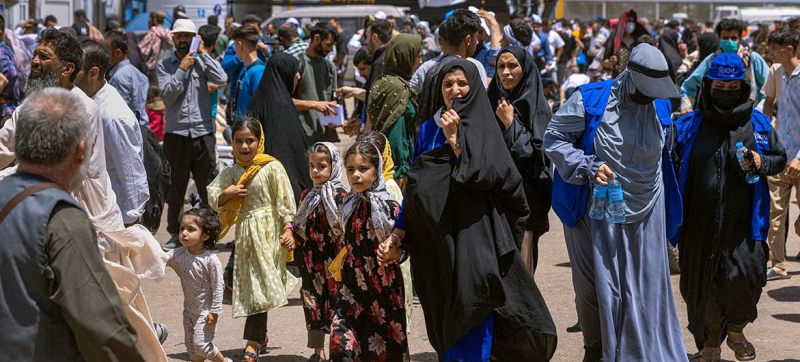- Protecting health demands no money: Bangladeshi expert |
- EU Deploys 56 Long-Term Observers Across Bangladesh |
- Appeals over nomination papers:18 more regain candidacies back |
- More than 100 dead in torrential rains and floods across southern Africa |
- Islami Andolan to Contest Election Alone in 13th Poll |
Afghanistan: Taliban Ban on Women Halts Lifesaving Aid Services

Women and girls cross the Islam Qala border, into Afghanistan.
The ongoing humanitarian response to the devastating Afghanistan earthquake continued on Friday, although essential services have been curtailed due to reinforced Taliban restrictions on women working with the UN.
“All of us at the United Nations are affected by the reinforced ban on female staff… We cannot operate without women,” said Arafat Jamal, UNHCR Representative to Afghanistan, a day after agencies warned that the measures have affected lifesaving assistance for hundreds of thousands.
Last Sunday, de facto Afghan security forces blocked national female UN staff and contractors from entering UN compounds in Kabul, UNAMA said in a statement.
In response, UNHCR temporarily closed its cash and support centres for vulnerable Afghans, both at the border and in areas where many returnees have arrived from Iran, Pakistan, and elsewhere. Registration, which involves biometric data collection, screening, and interviews, is “entirely impossible without Afghan female workers,” Jamal noted, emphasizing that over half of the returnees are women.
“This operational decision is not meant to punish anyone; it simply demonstrates that female workers are essential in certain circumstances,” Jamal added.
Since the start of the year, some 2.6 million Afghans have returned from neighbouring countries, many involuntarily. Jamal noted that the pace of returns continues to surge, with nearly 100,000 people crossing from Pakistan in the first week of September alone, “stretching our capacities and those of this country to the limit.”
UNICEF warned that Afghanistan is still reeling from the 6.0 magnitude earthquake that struck Kunar and Nangarhar provinces on 31 August, followed by severe aftershocks. At least 1,172 children have died, accounting for more than half of the total death toll, said UNICEF Country Representative Dr. Tajudeen Oyewale.
Dr. Oyewale recounted meeting young survivors in Machkandol, Nangarhar: three girls and a boy rescued from the rubble. “For the girls, it was even more sobering; they had lost their families, homes, and livestock,” he said.
The affected provinces are mountainous and remote. “It took us about three and a half hours to travel 40 minutes on paved roads and the rest on rough mountain dirt roads, full of turns, oncoming vehicles, and falling rocks,” Dr. Oyewale said.
The earthquake has compounded Afghanistan’s existing crises. In total, over 2,164 lives have been lost, 3,428 people injured, and at least 6,700 homes destroyed or severely damaged. “Behind these numbers are children standing alone in the rubble and families torn apart… UNICEF is doing everything to reach them with the support they need,” Dr. Oyewale said.

